We will return on Friday 29th of July 2022 for what will be our 10th year!
|
As is customary at this time of year, we will take our summer break. We hope all our readers have a very enjoyable summer
We will return on Friday 29th of July 2022 for what will be our 10th year! By John Considine 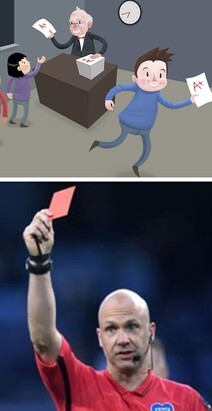 It is results season in many universities. If you listen carefully then you will hear lecturers taking umbrage with any effort by a student to shift the blame for a poor grade to the lecturer. “I graded the work that was presented”, is a standard line. I have also heard lecturers use the same line in staff meetings when explaining their grades. They may go further and say “they did not engage with the material”, “they did not turn up to class”, or “there was a poor dynamic in the class”. The message is clear. The primary responsibility for the grade lies with the student. It is hard to imagine a lecturer bias. The grades of individual lecturers may exhibit a bias based on attendance, attractiveness, or identity, but it is hard to imagine a bias that is present in lecturers as a group. Yet, some of those same lecturers, when conducting research, will claim that other groups are biased in their assessments. Sports economists like to claim that sports referees are biased in favour of the home team. Those of the rational choice persuasion will claim that the referees consciously make these biased decisions; those of the behavioural economics persuasion will claim that the decisions are unconscious. Regardless of the decision making mode, it would be like researchers claiming that lecturers display a bias towards attendance, attractiveness, or identity. A recent paper in Economic Inquiry by James Reade, Dominik Schreyer, and Carl Singleton uses data to show differences in outcomes in soccer games played with and without spectators. They then go on to claim that this shows that the referee is the primary channel through which social psychology works. A recent article in Frontier in Psychology is not convinced (and the authors do cite an earlier version of Reade et al). Let me borrow three sentences from Yannick Hill and Nico Van Yperen to illustrate their argument. “Additionally, it should be noted that studies on the home field advantage typically lack actual behavioral indicators that are needed to test whether refereeing decisions are actually biased or not. Hence, in future studies, these behavioral indicators should be collected to test whether the “referee bias” actually represents biased decisions by referees ... An imbalance in the proportion of fouls or yellow and red cards does not necessarily represent biased decisions toward either the home or the away team, but accurate decisions to different behaviors displayed by the teams.” A recent paper in the Journal of Economic Psychology threads a more nuanced line. The title of the paper uses the word “agents” – “Social pressure in the stadiums: Do agents change behavior without crowd support?” The author is Vincenzo Scoppa. Scoppa’s agents are players/team and referees. His measures include indicators of team performance and referee decisions. The paper shows that the measures, of both sets of agents, changed during the pandemic years. One of my favourite papers on home bias is co-written by Scoppa. It is published in the Journal of Sports Economics and formed the basis of a previous post on this blog (here). This week I decided to investigate the author via Google Scholar. I discovered that Scoppa also conducts research on the Economics of Education. In fact, he has a 2022 paper titled “Online teaching, procrastination, and students’ achievements: evidence from COVID-19 induced remote learning”. The emphasis is clearly on the students (players). That is not to say that Scoppa et al do not consider the possibility of a lecturer (referee) bias. In the literature review they note of a previous paper “They also show that instructor-specific factors, such as leniency in grading due to a more compassionate approach towards students in response to the difficulties caused by the pandemic, play an important role and might lead to erroneously conclude that online teaching is better than face-to-face teaching.” But Scoppa’s paper clearly puts the emphasis on the students’ actions. Maybe sports economists should place more emphasis on the players. By Robbie Butler
When I started to learn about economics for the first time - back in the late 1990s – I found many of the key concepts difficult to grasp. There was one exception – the monopoly. Maybe it was from a childhood of playing a board game of the same name or the frequent use of the term in everyday discourse, but the market structure was easy for me to comprehend. It quickly became one of my favourite parts of the school curriculum and my interest in the subject grew. I recall our school teacher telling us that monopolies were inherently damaging to economic activity as they forced customers to pay higher prices for goods and services. It was in the interest of policymakers, and society as a whole, to reduce or remove monopolies where they existed. The timing of my introduction to economics on this front could not have been more appropriate. Ireland had quite a few State monopolies at the time, and one – telecommunications – had just been removed and a second entrant allowed to compete for customers. This we were told would revolutionise the telecommunications sector. Other state monopolies in areas such as energy and air travel would later go the same way as the telecommunications sector. The monopoly was dying off. Yet when it comes to sport, monopolies are yet to go out of fashion. In fact, supporters largely seek to maintain them in the public interest. Last year, competition posed to UEFA by the European Super League was seen as a bad thing by almost every football supporter and club outside of the 12 defectors. UEFA’s monopoly was sacrosanct and won the argument. More recently, golf has experienced a similar event. However, where UEFA succeeded in crushing the revolt, the PGA Tour has been far less successful and the new LIV Golf Tour is up and running. Some of the players have resigned from the PGA and will seek pastures new with LIV. Generally, the reaction by golf players, commentators and fans has been negative towards the breakaway players. Economic concepts have been used to describe much of what is going on, with “business decision” “contractor” and “free riding” examples used in recent days. Again, most don’t like the breaking up of the PGA monopoly. Sport it seems is different. And possibly the worse ‘monopoly’ to breakup, is that in sports broadcasting. In the recent past, one sports channel dominated sports broadcasting on these islands. It showed pretty much everything. Today the market has been sliced up so that various subscriptions are often required to watch the content that was once available with the monopoly. The evolution of this breakup continued this week. Apple have signed an agreement with Major League Soccer (MLS) to broadcast all games on Apple TV from 2023. Football (or soccer) is going online. While I suspect there will hardly be a clammer in this part of the world to sign up for Apple TV, this is a glimpse of the future. Boxing has largely migrated to DAZN. It is only a matter of time before UEFA, the EPL, etc. migrate to a platform like this. Maybe monopolies weren’t that bad after all. By John Considine 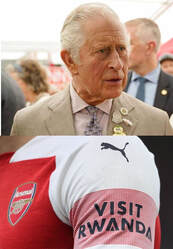 “My arse” were the words added to a sentence by a character in The Royle Family in his effort to convey questionable credibility to what preceded. Today’s English newspapers convey the alleged views of a member of the Royal Family. It seems that the Prince of Wales is appalled at the policy of his democratically elected government to outsource the processing of asylum seekers to Rwanda. This would be in-person processing and the asylum seekers would be flown to Rwanda for the process. Imagine the asylum seekers being flown to Rwanda on Emirates Airlines. Maybe the relevant minister is an Arsenal fan and has been influenced by the sponsorship of the Arsenal shirt. On the sleeve they saw “Visit Rwanda” and on the front they saw “Fly Emirates”. At the start of this month, another post on this site drew attention to the questionable benefits of having football tourists. Specifically, Robbie Butler’s post examined the way authorities in Seville asked Rangers fans without tickets to stay away. A couple of days earlier, Liverpool football fans must have felt that the French authorities did not want them in Paris for the Champions League Final – tickets or not. It seems strange that Rwanda would want football fans – even ones with the limited aggression and passion of Arsenal fans! Surely Rwanda does not want those shadowy forces that seek to give English football fans a bad name. Tonight, England footballers play Italy behind closed doors. Fans are excluded because of trouble in the UEFA Nations League final between the same two teams at Wembley. At his press conferences the England manager claimed that those who caused the trouble were not football fans. It would seem that the football game was not upper most on their minds but why do they go to English football games rather than England rugby or cricket games. 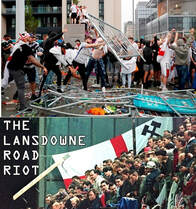 Also taking place today, at Trent Bridge, is a cricket test match between England and New Zealand. It is possible that in the New Zealand ranks are descendants of previous generations deported by the British government in the days before air travel. I wonder how many of the Liverpool football fans who sing a version of The Fields of Athenry understand the lyrics “a prison ship lies waiting in the bay”. Other ships ferried the Irish, those with a little more choice, off the island. A famine in Ireland while it was under British rule. The Irish were fortunate that economic migration to Britain was possible. One would like to think that they, and their descendants, added to life in their new home. They were probably also sensitive to the relationship between migration and economic circumstances. One of those descendants was Caroline Aherne. Aherne co-wrote The Royle Family. She also was the host of The Mrs Merton Show. In one episode, Aherne asked the comedian Bernard Manning, “Who do you vote for now Hitler’s dead?” - Manning drew attention to Aherne's Irish background with a comment about leaving bags (bombs) under tables. Manning explained that he told racist jokes because it paid. Economic incentives. In another episode Aherne asked Debbie McGee, “What first attracted you to the millionaire Paul Daniels?” Before this week I often wondered how many tourists went to Rwanda because of the "Visit Rwanda" words on the Arsenal shirt. In his blog post earlier this month, Robbie Butler drew attention to the questionable statements made by economic consultants about the link between tourism and major sporting events. Jim Royle's "my arse” seems to apply to many of these claims. Whatever help Rwanda got from being on the Arsenal shirt, it is hard to imagine that its image has been aided by the link with current British policy. Unfortunately, to paraphrase Jim Royle, it is likely to be "Visit Rwanda? My arse." By Ed Valentine I feel sorry for the Irish youth of today. From a footballing perspective it’s a bad time. Older readers will have enjoyed seeing the best Irish soccer stars playing week in week out in not only the English Premiership but also the Champions League. Roy Keane and Dennis Irwin, the latter who signed for Manchester United 32 years ago today, lifted much silverware between them with a host of talent, and appeared weekly for the top English club teams. From 1988 to 2002 the Rep. of Ireland played in 4 major tournaments with memorable qualification victories over Spain in 1989 and the Dutch in 2001, not to mention wins against England and Italy in the finals of Euro88 and World Cup94. Jack Charlton and Mick McCarthy guided the boys in green to some big scalps. It was a great 15 years or so to be a fan. Contrast this to the latest era in Irish international competition. The days of punching above our weight have come to an end. Under Stephen Kenny’s reign Ireland has not beaten a team ranked in the top 100 of the ELO football rankings in a competitive match. The data in the table below shows just how poor the results have been with Kenny unable to guide the team to victory against opponents ranked 48 places below with “failed to score” being a regular phrase in the media post-match reports. Even during the major tournament “barren” period, between 1995 and 2001, the Rep. of Ireland were always in the ballpark of the playoffs. Now on the park the team are just played off. And against minnow opposition too. I find it difficult to the FAI’s decision to renew Kenny’s contract. There is no way to know, but it’s worth a thought experiment to assume that a more high-profile manager would get a tune out the current squad. Whilst the number of minutes played in the Premier League by Irish players is significantly below previous eras, it is entirely possible that a manager in the Chris Hughton or Alan Curbishley backet would do better.
It has been reported that Kenny’s FAI contract is worth in the region of €500,000 a year plus performance bonuses. It’s likely that a group of better able managers could be attracted for 30-40% more salary. Even if the initial outlay would approach €1 million a year the lost revenue from missing tournaments due to harder qualification draws brought about by defeats to Luxembourg and Armenia will cost more in the long run. In an era when Premier League managers often don’t last 2 seasons it’s surprising that Stephen Kenny has been rewarded with a new deal based on the results to date. By Robbie Butler In late 2015, much travelled former England manager Sam Allardyce said "'I would probably have a different opinion to most young managers – and that is that football is about winning, always has been and always will be. 'The only way you keep your job is by winning. Playing football the right way and losing makes you lose your job." Allardyce would know. He has managed a record 8 clubs in the English Premier League. He is also an appropriate person to use in this piece as he began his managerial career in the League of Ireland with now defunct Limerick City. The data below presents the record of Rep. of Ireland managers since 1969. Prior to this, the team was selected by committee and the Football Association of Ireland (FAI). The first figure presents data on all matches where the team has failed to win, by manager. It does not control for the opposition, venue, competition, etc. but is rather an overview of all games under each manager. The X-axis lists the number of games in charge, while the Y-axis counts the number of games each fails to win. In theory, the "perfect manager" would win every game so the line would be horizontal and at the bottom of the chart. Hence, the steeper the line, the poorer the results. Incumbent Stephen Kenny has clocked up more failures to win than any manager to date after 24 games. Only Mick Meagan had a worse record and was sacked after his 12th failure in a row to win. Kenny is also doing worse than Eoin Hand, who had a less than inspiring time in charge. That said, Mick McCarthy was just one win better than Kenny in his first stint in charge and went on to manage the team for the second longest period of time. Big Jack's success is easy to see. Charlton has the flattest (blue) line and survived for 95 games. Brian Kerr had a similar record to Charlton and was probably very unlucky to not have his contract extended. The next figure looks at the last 6 Rep of Ireland managers and only considers competitive games. I change the focus here to allow for draw so it only counts losses. Again, Kenny's stats are worse than any of the 5 managers before him (and further back too). Kenny has lost 8 competitive games so far. This was the amount that led to the sacking of both Martin O'Neill and Giovanni Trapattoni. Kenny is a certainty to surpass this total before he leaves the job. Kenny has also clocked up 8 competitive defeats in just 16 games. Steve Staunton lost just 3 competitive games and was sacked after his 11th in charge. O'Neill had lost four of his first 16 competitive games in charge and Trapattoni just two. Mick McCarthy lost a single competitive games (Switzerland away) in his second coming.
In fact, McCarthy lost nine competitive games in total during this first stint in charge between August 1996 and October 2002. Kenny could match that record next weekend in well under 2 years. By Robbie Butler Penalties are often a source of attraction for economists seeking to explore decision making. The data below considers English Premier League (EPL) penalties scored by 40 of the teams that have appeared in the EPL (EPL) to date. It does not included missed penalties - but as a general rule - the conversion rate over the long run is about 70%. From the first graphic we can see that clubs that have appeared in the most EPL seasons to date (31 being the maximum) have scored the most penalties. Chelsea have converted the most to date (88), Man City are second (86), with Man Utd (84) and Liverpool (82) next. Arsenal (71), Tottenham (63) and Everton (60) are well ahead of 8th placed Crystal Palace (48). However, the south London club are somewhat of an outlier. The Eagles have scored 48 penalties from just 13 seasons in the EPL. The second figure controls for the number of seasons in the EPL. No longer do the top clubs dominate. Penalties per season appear to favour some of the small clubs - with fewer years in the EPL - and is led by recently promoted Bournemouth. Blackpool are dropped from the figure, (and would be clearly out in front) having been awarded 7 penalties in their only season in the EPL. Brighton, Crystal Palace and Man City make up the top four. At the other end, QPR, Middleborough, Leeds United and Charlton Athletic might all consider themselves unlucky. These four have scored less than one EPL penalty on average per season. Maybe it is poor finishing. Or it could be a lack of opportunity. Or both.
Assuming the conversion rates are stable across clubs, there is no evidence that the bigger and more popular clubs score more penalties. |
Archives
June 2024
About
This website was founded in July 2013. Categories
All
|
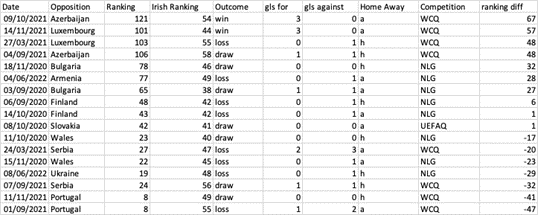
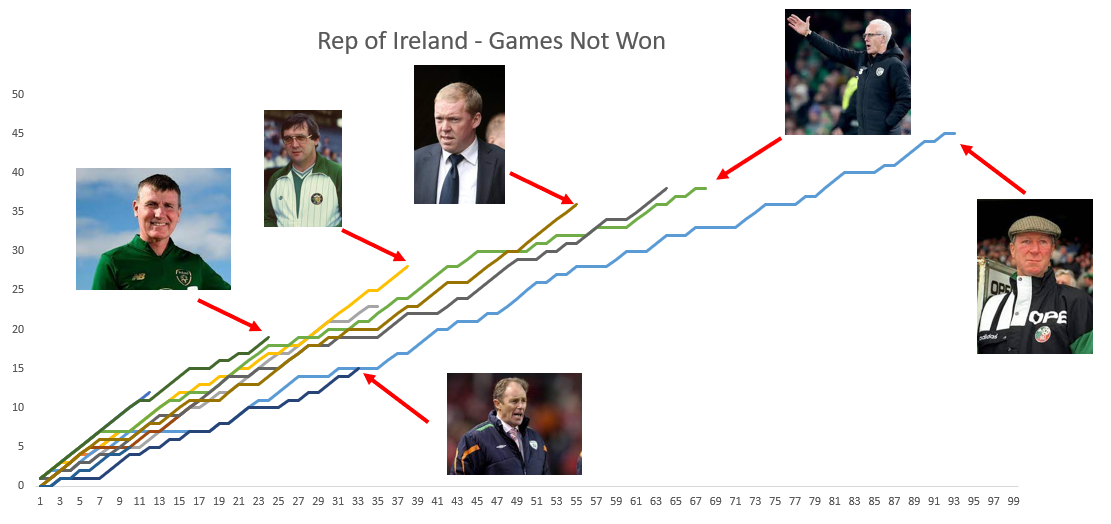
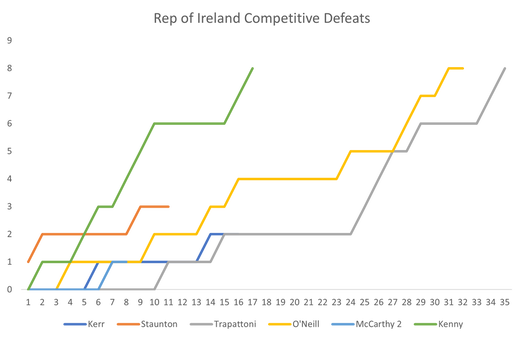
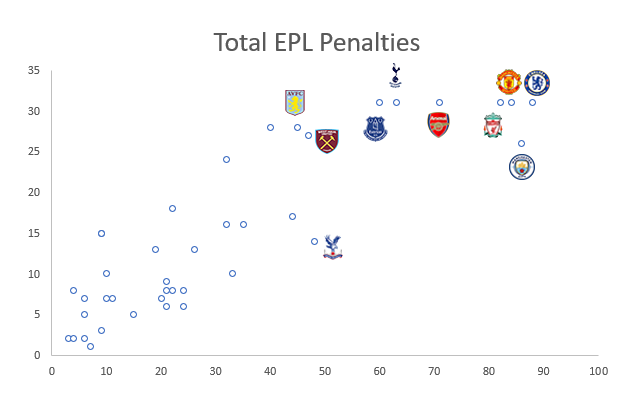
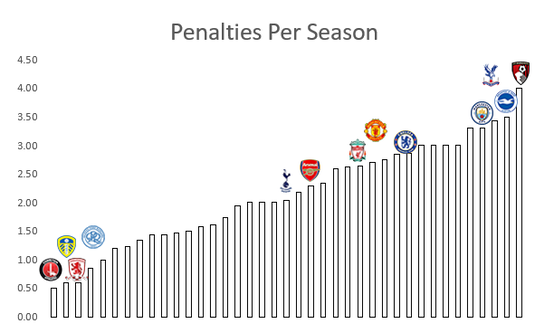
 RSS Feed
RSS Feed